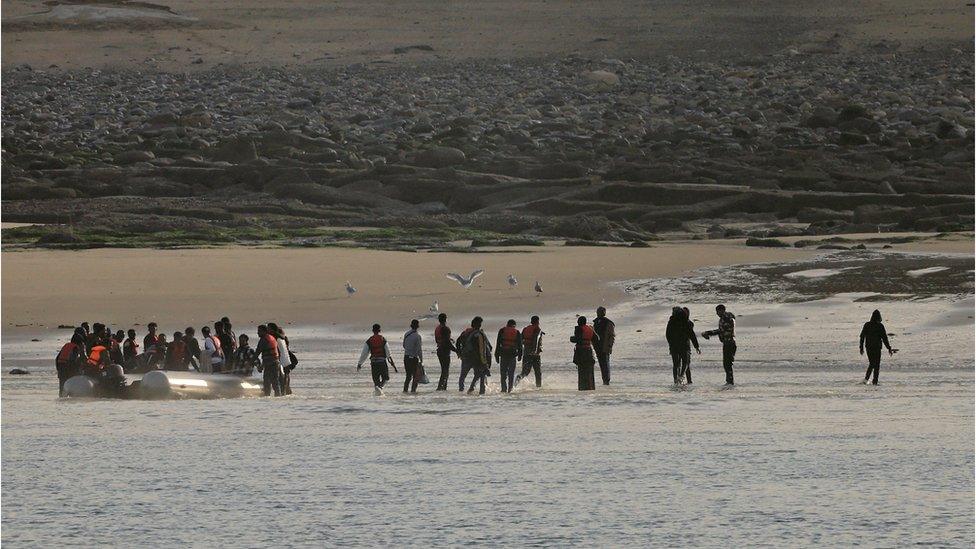Rwanda flights bill begins tricky House of Lords stage
- Published

The government's plan to send some asylum seekers to Rwanda is undergoing a series of votes in the House of Lords.
The government has been already been defeated three times on Monday afternoon and there will be further votes into the evening.
It's almost two years after ministers first announced the plan to send some migrants to east Africa.
The government has promised that the first flights to Rwanda will happen "in the spring".
You might recall the controversy over the idea back in January, when the former Conservative deputy chairman Lee Anderson was one of three Tories to resign, as around 60 of Rishi Sunak's MPs defied him.
Since then, the legislative digestive process has been gurgling on in the House of Lords, leading to votes on Monday afternoon and evening.
Among the amendments being looked at, at what is known as the report stage in the House of Lords, are ones which challenge the government's assessment that Rwanda is safe.
One suggests Parliament can't judge it to be safe until measures such as a Monitoring Committee have been fully implemented.
Another says the presumption that the country is safe must be open to challenge if credible evidence emerges.
There is also an amendment that tries to protect victims of modern slavery.
Another suggests those who have put themselves in harm's way in support of the UK's armed forces should be exempted from being sent to Rwanda, as should their partners and dependents.
The big question
The government has already suffered three defeats on Monday - the first on an amendment specifying the bill must maintain "full compliance with domestic and international law", and the second on an amendment which says Rwanda can't be judged a safe country until the Rwanda treaty has been fully implemented.
The third amendment called for monitors to check whether Rwanda is safe for asylum-seekers, that Rwanda has fully implemented its treaty with the UK, and that it's still complying with that treaty as time goes on.
Further defeats could follow this evening, with a series of votes expected. Peers will debate the bill on Wednesday too.
This will means the legislation will have been changed, but this isn't the end of the matter.
In the coming weeks, the bill will return to the House of Commons, where a lot of the changes are expected to be overturned.
It is thought the bill could become law - having completed all of its parliamentary stages - before the end of this month.
The big question then is how long it takes after that for a first flight with migrants on board to take off for Rwanda.
"There won't be much hanging around," is how one government source put it to me.
Election date?
It has prompted some with a key eye on the calendar to speculate that all this could coincide with the last possible moment the government could call a general election for early May.
But the vast majority at Westminster believe the government is much more likely to go to the polls much later in the year.
Meanwhile, Home Secretary James Cleverly, the cabinet minister with responsibility for the Rwanda plan, is in Brussels for a meeting of what is known as the Calais Group.
The get-together is for countries with an interest in cross channel illegal migration, including France, Belgium, the Netherlands and Germany.
Over the weekend, a seven year old girl died after a small boat capsized and sank just north of Dunkirk.